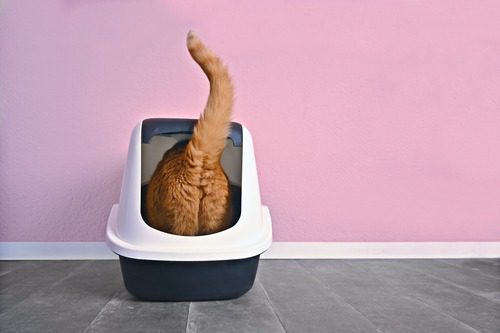My Cat Has Diarrhea But Seems Fine: Should I Worry?
If your cat is having diarrhea but still seems to be eating, playing, and acting like their usual self, it’s easy to assume the issue will pass on its own. However, ongoing or recurring diarrhea, even when a cat seems otherwise fine, can indicate an underlying issue that shouldn’t be overlooked. While occasional stomach upset might not be urgent, persistent symptoms can affect your cat’s long-term health. In this blog, we’ll explore possible reasons your cat has diarrhea but seems fine, when you should take it seriously, and how Warrick Veterinary Clinic in Warrick County, IN, can help.

What It Means When Your Cat Has Diarrhea But Seems Fine
Even if your cat is active and behaving normally, diarrhea still signals that something isn’t quite right in their digestive system. Cats are known for hiding discomfort, so normal behavior doesn’t always mean there’s no problem.
The Digestive System May Be Under Stress
Diarrhea happens when the intestines are inflamed or irritated, causing them to move stool through too quickly for water to be reabsorbed. While your cat might appear unaffected, they could be losing important fluids and nutrients.
Some Cats Are Resilient But That Doesn’t Mean They’re Healthy
Just because your cat isn’t vomiting or showing signs of distress doesn’t mean their body isn’t under strain. Chronic or recurring diarrhea can point to problems such as food intolerances, parasitic infections, or gastrointestinal disease.
Why Does My Cat Have Diarrhea?
There are several potential reasons a cat might develop diarrhea without any obvious change in behavior. Some are temporary and mild, while others may be ongoing and require veterinary attention.
Dietary Changes or Sensitivities
A sudden switch in food, exposure to table scraps, or eating spoiled food can all trigger diarrhea. Some cats also have food allergies or intolerances that lead to digestive upset.
Parasites
Internal parasites like roundworms, hookworms, or giardia are common in cats and can cause intermittent or chronic diarrhea. Your cat may appear healthy while still spreading parasites through their stool.
Stress-Related Diarrhea
Stress from changes in the home, new pets, or loud noises can upset a cat’s digestive system. Even without signs of anxiety, stress can still affect their gut health.
Inflammatory Bowel Disease (IBD)
IBD is a chronic condition in which the gastrointestinal tract becomes inflamed, often causing recurring diarrhea. Cats with IBD may appear healthy in the early stages before symptoms progress.
Hyperthyroidism or Other Illnesses
Conditions like hyperthyroidism, pancreatitis, or liver disease can present with diarrhea before other symptoms emerge. Bloodwork and diagnostic testing may be needed to detect these issues.
When to Be Concerned About Your Cat’s Diarrhea
While a single loose stool may not be alarming, there are certain red flags that warrant a closer look, even if your cat seems fine otherwise.
Diarrhea Lasting More Than 48 Hours
If your cat’s diarrhea continues for more than a day or two, it’s time to contact your veterinarian. Prolonged symptoms can lead to dehydration and nutrient loss.
Repeated or Recurring Diarrhea
A pattern of off-and-on diarrhea may point to a chronic condition. This could be related to diet, parasites, or something more serious requiring further investigation.
Additional Subtle Symptoms
Keep an eye out for signs like weight loss, dull coat, changes in appetite, or unusual litter box behavior. These clues may indicate that your cat’s diarrhea isn’t as minor as it seems.
How Diarrhea Affects Your Cat Over Time
Even if your cat shows no signs of distress, chronic diarrhea can cause health problems in the long run.
Dehydration and Electrolyte Imbalance
Loose stool means your cat is losing more fluids than usual. Over time, this can lead to dehydration, which may not be immediately obvious but can have serious consequences.
Poor Nutrient Absorption
The body needs time to absorb nutrients during digestion. Chronic diarrhea interferes with this process, potentially leading to deficiencies, weight loss, and decreased energy.
Discomfort and Inflammation
Even without vocalizing or acting out, your cat may be experiencing mild discomfort or bloating from ongoing gastrointestinal irritation.
What You Can Expect from a Veterinary Visit at Warrick
If your cat has diarrhea but seems fine, our team at Warrick Veterinary Clinic can help get to the bottom of the issue with a thorough evaluation and diagnostics.
- Physical Exam and History: We’ll ask questions about your cat’s diet, environment, stress levels, and any changes in behavior to help determine possible triggers.
- Fecal Testing: A fecal exam can identify parasites, abnormal bacteria, or signs of inflammation in the digestive tract.
- Additional Diagnostics: Depending on the case, we may recommend bloodwork, imaging, or food trials to identify chronic conditions or underlying health problems.
The Role of Diet and Environment
Diet and home environment are two major factors that can influence your cat’s digestion even when they appear to be healthy on the outside.
Maintain a Consistent Diet
Avoid sudden changes in food and refrain from giving your cat table scraps or unfamiliar treats. A consistent, high-quality diet supports long-term digestive health.
Reduce Household Stressors
Cats thrive on routine. Keeping their daily schedule predictable, offering quiet spaces, and limiting changes in their environment can reduce stress-related digestive issues.
Why Early Action Matters
Waiting too long to address diarrhea especially if it becomes frequent can increase your cat’s risk of more serious problems. Cats are experts at hiding discomfort, so subtle issues can go unnoticed without a proper evaluation. If your cat has diarrhea but seems fine, it’s still a good idea to schedule an appointment to rule out anything serious. Our team at Warrick Veterinary Clinic in Warrick County, IN, is here to help you get clear answers and peace of mind. Call us today at (812) 897-4855 to schedule a visit. Even if it turns out to be something minor, you’ll know you’re doing the right thing for your cat’s health.
